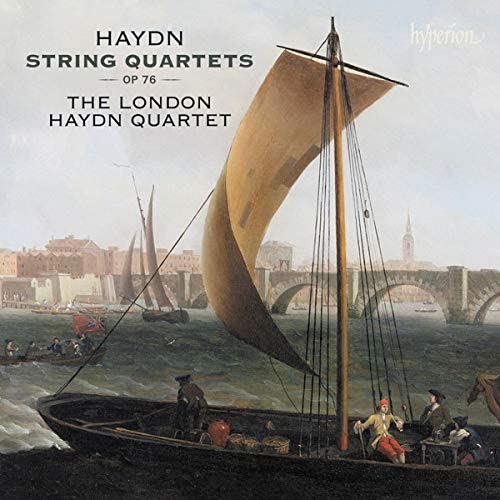The London Haydn Quartet
153:29 (2 CDs in a single jewel case)
hyperion CDA68335
Click HERE to buy this on amazon.co.uk [sponsored link]
Few other than benighted beings like record critics are likely to listen closely to all six quartets of Haydn’s opus 76 in one sitting, especially in performances as well endowed with repeats as these by The London Haydn Quartet. Yet to undertake such a task is to marvel again at the richness of invention and almost kaleidoscopic variety found in this remarkable set of works, composed as the result of a commission by Count Joseph Erdődy, the chancellor at the Hungarian court in Pressburg (Bratislava). Probably commenced in 1796, the year after Haydn returned from the second of his two London visits, they were completed the following year and published in London and Vienna in 1799. Curiously for such late works, the original autograph disappeared completely; the present recording employs those first editions.
In some ways, the set consolidates those of opp 71 and 74 that Haydn wrote in London, works in which Haydn took a genre previously identified with the salon into the concert hall. Like them, the quartets of op 76 contain many passages of almost orchestral sonority, the tersely powerful chordal passage that opens the Presto finale of No 3 in C being a particularly striking example. In other ways, it seems that even in his late 60s the mature Haydn is still probing, experimenting with new ideas. Both No 1 in G and No 6 in E flat for the first time have presto minuets that are scherzos by any other name, a new conception that carries through to the two quartets of op 77 (1799). Yet possibly the most notable aspect of all is the impression given time after time that here is a mature composer at the pinnacle of his powers, a composer happy to engage with supreme contrapuntal writing of a kind we sometimes fail properly to acknowledge in Haydn’s works – listen for example to the canonic writing in the so-called ‘Witches Minuet’ of the D-minor Quartet (No 2) or the wonderful 3-part counterpoint and chromaticism in the third of the variations on the ‘Emperor’s Hymn’ (the C-major Quartet). There are, too, movements in which Haydn seems to have captured an inner repose given only to those at peace with themselves and the world. The ineffably lovely Largo of No 5 in D comes immediately into the mind, surely the music of a man that has found such peace, a peace ruffled only momentarily by darker thoughts before returning to utter tranquillity, qualities also found in the Adagio that gives the ‘Sunrise’ its name (No 4 in B flat). This being Haydn, humour and the folk element that reminds us of his humble beginnings are never far away, sometimes found together. The finale of the B-flat Quartet, for instance, is a cheeky east-European folk-song that surely cries out to have bawdy words fitted to it. And this would equally not be Haydn without the odd surprise. The D-major Quartet opens with an easy-going allegretto that has a Schubertian air of insouciance, proceeding in this fashion until a sudden allegro bursts out to take the same thematic material into an entirely unexpected and more brutal world.
The performances of this glorious music – and there is so much more that could be said about it – are in general extremely rewarding, attaining the same level of musicality that I praised in the ensemble’s recording of op 64 I reviewed for this site. Tempos are in the main sensible and well-judged, though for me some of the slow movements are taken just that shade too slowly. That wonderful Largo of No 5 is a case in point, but it is so beautifully drawn forgiveness is not difficult. Otherwise, my main caveat would be that, as with the op 64 recording, dynamic contrasts might have been made more of. But the playing is technically of a high order and the excellent balance also adds to the pleasures of a set that will delight anyone collecting a complete cycle now nearing completion.
Brian Robins
